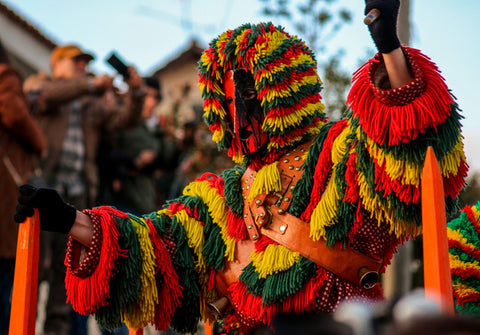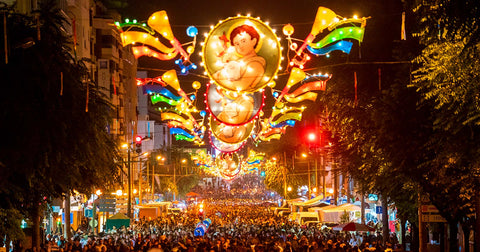Every year, in the village of Podence, in the heart of Trás-os-Montes, an ancient tradition comes to life during Carnival: young men are called upon to embody the Caretos - masked characters in flamboyant costumes who invade the streets, ringing the deafening sound of their bells. This fascinating ritual, listed as a UNESCO Intangible Cultural Heritage, combines folklore, chaos and a unique festive atmosphere. But what are the origins of this custom and why does it continue to captivate locals and visitors? Let's find out in this article!
A reinvented pagan tradition
The Caretos of Podence have their origins in pre-christian rituals, probably Celtiberian, celebrating the end of winter and the arrival of spring. These masquerades symbolized renewal, fertility, and the warding off evil spirits. Over time, the tradition became associated with Carnival festivities, becoming a strong cultural expression of the Trás-os-Montes region.
The costumes - an explosion of colours
The Caretos are recognizable by their costumes composed of red, yellow, and green fringes made of wool. Their sheet metal or leather masks with pointed noses are often adorned with exaggerated shapes and demonic motifs, accentuating their mysterious and mischievous appearance. Every detail of the costume has a meaning, with the bright colours evoking the vitality and energy of the reborn spring. Another distinctive element is the large bells attached to the waist, whose tinkling disrupts the daily calm.

The “chocalhar” ritual
The highlight of the Podence Carnival is the famous "chocalhar" (ringing). On Shrove Sunday and Carnival Tuesday, the Caretos run noisily through the streets, chasing young girls in particular, ringing their bells around them. They enjoy themselves in this way, protected by their anonymity. This ritual, once considered a blessing for fertility and prosperity, is today a joyful and mischievous manifestation of tradition. Young men use this occasion to demonstrate their vigor and dynamism.
On Shrove Sunday night, fictitious marriages are celebrated between young single people in a ceremony marked by mockery. The "married " are designated without having a say, adding to the playful aspect of the tradition. The next day, the boy must visit the girl assigned to him, and as a token of gratitude, he receives pastries accompanied by a delicate wine.
The rehabilitation of a threatened tradition
Although the tradition of the Caretos experienced a certain general disinterest during the 20th century due to the rural exodus and social changes, the tradition was rehabilitated thanks to the efforts of the inhabitants of Podence and local associations, in particular the association "Grupo de Caretos de Podence". In December 2019, the UNESCO inscribed the Caretos of Podence as part of the Intangible Cultural Heritage of Humanity, thus recognizing the importance of this ancient and unique celebration.
An unforgettable experience for visitors
Today, the Podence Carnival attracts thousands of visitors eager to experience this immersive and authentic experience. In addition to the Carnival festivities, tourists can visit the Casa do Careto, a museum dedicated to the history and craftsmanship of this tradition. The festivities are accompanied by tastings of regional specialties such as "alheira de Mirandela" or wine from the region, reinforcing the cultural roots of this event.
Why should you discover the Caretos of Podence?
The Caretos of Podence are not just a folkloric spectacle, but a true testament to the Portuguese heritage and cultural richness of Trás-os-Montes. Participating in this event means immersing yourself in a living tradition steeped in mystery, passed down from generation to generation, and which continues to amaze and surprise locals and visitors alike.
---------------------------------------------------------------------------------------
Image source
- Header: https://www.caretosdepodence.pt/node/192




Comments (0)
There are no comments for this article. Be the first one to leave a message!